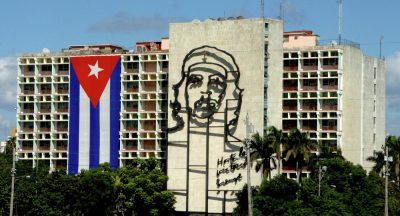Sixty Years of the Cuban Revolution

We are urged to resist Trump’s lies: the lies of US capitalism. But there are lies about those lies that are not resisted. They are not recognized.
You see this in an intriguing new book about US interrogation during the Korean War.[i] The “untold story” it tells is not untold. It is about “a complex eco-system of violence, intimacy and bureaucracy” aimed at solidifying US global power. We learn the self-proclaimed guardian of the world lied about its methods, claiming “our traditional lack of imperialistic ambition”.
The empire denied being an empire. The war in June 1950, Monica Kim argues, was about violation of the 38th parallel; by 1952 it was violation of human subjects. The US made the “stunning” claim that a simple “yes” or “no”, recorded by an interrogator, was the “free individual choice” of Koreans and Chinese prisoners. US policy of voluntary repatriation was psychological warfare.
It is not an “untold story”, not even, or especially the subject-violating part. Only the details change. US subject fashioning was known more than a century before the Korean War. A group of non-radical priests in Cuba began a remarkable debate (1836-8), influencing neighboring countries, about precisely this question.[ii] They knew imperialism erases people. It erases them to themselves.
It deadens moral imagination so there is no “free choice” to be human. You can’t meaningfully choose what you can’t imagine. This is the part of the “new liberal paradigm” Kim misses: Truth is useless if we can’t imagine, or don’t want to accept, what that truth explains. If, in daily life, I accept the liberal lie about “free individual choice”, I won’t believe what contradicts it, no matter the evidence.
It is how understanding works and it is well-known in North American philosophy of science. The independistas in Cuba, two centuries ago, knew this. Moreover, they wrote about it: a lot. They exposed the “stunning” lie long ago. They refused to participate in it and their ideas survived. They still do.
Raúl Castro said on January 1, 2019, the sixtieth anniversary of the Cuban Revolution:
“Only thus can we understand the feat of having withstood the tough years of the Special Period, when we were left alone in the middle of the West, 90 miles from the United States. Then, nobody in the world would have bet a penny on the survival of the Revolution.”
It’s an understatement. Not only would no one in 1990 have bet on Cuba’s survival, no one in 2019 believes it happened (in the North, at least). If they did, they’d ask how it happened and they’d investigate the “decolonizing subject” that explains it.
The “decolonizing subject”, Kim writes, claimed a voice. Sure, and it is ignored. It is not in English. Trendy jargon like “decolonizing subject” describes the “new liberal paradigm” without understanding what that paradigm does. It lies about freedom, true. But it lies about lies. They are not refuted by truth.
Lies of the empire, sustained by power, “fashioning subjects” through fear, are only fully grasped by rejecting them in daily life, by refusing to participate.
We can learn from Hans Fallada’s Alone in Berlin. The protagonists, Otto and Anna Quangel, leave postcards around Berlin, criticizing Hitler. The postcards are useless. They achieve nothing, materially. But Otto and Anna die “without moaning and whimpering”.
That’s huge. They suffer, of course. But their examples sow seeds for a future (better) Germany. Or so Fallada suggests. Otto says to his Nazi tormentors, “at least I stayed decent. I didn’t participate”. And the judge at the trial “could see recognition [of Otto’s dignity] in the faces of the spectators in the courtroom”. He wanted at all costs “to strip the accused of that recognition”.
He can’t do it. Otto laughs in the courtroom and Anna’s eyes are “as serene and merry as [Otto] had ever seen them”. The empire lies about Venezuela as it lies about Cuba, and it will continue to do so. But the truth will survive and will motivate because it will be lived by some. And it will be recognized.
It will be lived for the same reason Otto and Anna keep handing out their postcards. As Otto says to Anna:
“Who wants to die. Everyone wants to live, everyone – Even the most miserable worm is screaming for life! I want to live too. … [But I want] to die properly, without moaning and whimpering. That would be disgusting to me…”
It is not the lies that matter most. It is whether they are lived. This was known once in the US. During the anti-war movement of the 70s, there was a slogan: There are no innocents. It meant a comfortable life, promoting values sustaining the empire’s lies, was collusion in the slaughter such lies justified.
It is a hard truth for the “new liberal paradigm”. Kim says the empire used the “power of ideas”. The independistas knew it was the nature of ideas they had to discuss. They must be lived. It will eventually be called an “untold story” by some academic in North America. But it has been told and still is being told in Venezuela and elsewhere. It is because it matters, as Otto noticed, that “at least I stayed decent”.
*
Note to readers: please click the share buttons above. Forward this article to your email lists. Crosspost on your blog site, internet forums. etc.
Notes
[i] Monica Kim The Interrogation Rooms of the Korean War: The Untold History(Princeton University Press ,Feb 5 2019). See forthcoming review at https://www.nyjournalofbooks.com/
[ii] https://www.counterpunch.org/2015/09/30/cubas-quiet-wealth-why-it-is-needed/

